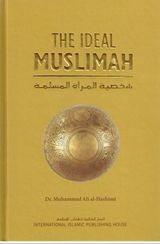|
*This article is written by an SFC Guest Contributor *  Bismillah al-Rahman al-Raheem Assalaamu alaikum, and thank you for stopping by to read my very first article here on Striving for Clarity! I am so excited to be able to contribute to the “Ideal Muslimah” section of this website, alhamdulillah, and today I want to start by writing a short article to share just a couple of my reflections on the idea of the “ideal Muslimah.” Often when we hear the word “ideal”, we thinks of things like our ideal day, ideal job, ideal life, ideal husband etc. These all tend to be things that we either want really bad and don't have, or that we think we “should” have. The word ideal often carries connotations of perfection, of finally having arrived at a long-awaited destination. “Ideal” can often feel like something that is just a dream, a wish, something abstract and unlikely to happen in our real world. I remember one of the books I read within the first year after converting to Islam was The Ideal Muslimah. I loved the book, primarily because there is a lot of valuable information in there.However, the very first time I read it, as a budding new Muslimah only six or seven months into her journey with Islam, it left me feeling a bit overwhelmed. I was sure I could never possibly be a very good Muslimah, let alone an ideal one. It has been three long years since I first read it , and I recently reread the book. It was the exact same copy that I read all those years ago, but with this reading, I took a completely different message from it. This time it left me with a sense of motivation instead of despair. The change was not in the content of the book itself, but it was a change in my own mindset that caused me to take such a different lesson from the book than I had before. I have learned in these three years that on our journey to become the “ideal” Muslimah, ideal doesn't necessarily mean what it sounds like it does in normal usage. On this journey, ideal isn't the end of the journey, it is a constantly changing path. As the name of this site suggests, an ideal Muslimah is actually a striving Muslimah. It is one who recognizes her weaknesses and is seeking to improve them. It is one who desires those good qualities in herself and seeks to practice them. It is one who is working to the absolute best of her capabilities to be the best kind of woman she can be, based on what Islam has outlined for her. An ideal Muslimah is a Muslimah who makes mistakes, and learns how to be better from them. What I want you to keep in mind when reading any of my articles in this section is that no one in this life will ever be perfect. I myself am far, far from it, but every day is an opportunity for us to wake up and be better than we were the day before. We have so many amazing Muslim women as role models both from the time of the Companions رضي الله عنهم(May Allah be pleased with him) and throughout our rich history, and they give us extraordinary, yet human, examples to strive towards. If you are reading my posts and looking to implement changes in your life, I want you to know that change does not have to be a huge grand gesture. Instead, it can be the most minute thing that shifts, as long as you work at it persistently each day. The Prophet said: “Take on only as much as you can do of good deeds, for the best of deeds is that which is done consistently, even if it is little” I have so many ideas for things I would like to share here, and I am so grateful to be able to be on this journey with you, my sisters in Islam. Wishing you all the best, until next time, in shaa Allah! AuthorAshley Bounoura is a writer, revert, tea-drinker, and cat-lover. She is the founder of the blog Muslimah According to Me, where she shares inspiration and encouragement for Muslim women on their individual spiritual journeys. Ashley also has a collaboration on a forthcoming book, the Qur’an Journal, which will be available mid-November,
8 Comments
In the Name of Allah, Most Gracious, Most Merciful  Surah Al-Muzzammil “Truly the rising by night is most potent for governing (the soul) and most suitable for (framing) the word (of prayer and praise).” When reading this surah I was reminded of the significance of “prayer and the practice of humility” in our spiritual life and the fate of those who reject faith and revelation. I noticed Muslim women avoided visiting each other especially before the time of prayer? Maybe some were to busy with children but others felt the same way I used to feel. I was a little nervous and shy about leading the prayer in my home. Usually, my thoughts did not focus on demonstrating my best efforts or learning from guests in my home. I was self-conscious and lacked confidence in my recitation, my Arabic was poor, my knowledge of Islam was limited and I was concerned about the size and comfort of our prayer space. Yes it was my foolish pride. I also remembered being told that sometimes husbands or brothers would recite only the shortest surahs in the Qur’an, as fast as they could. Do you think they rushed to complete the prayer because they were busy with other things or had it become a boring ritual? Also, some Sisters said they preferred not praying at a particular mosque or with a particular Imam. Other Sisters chose not to pray at any mosque. I believed these were cultural issues. “May Allah forgive us.” When is the best time to study the Holy Qur’an with children? They are called “teachable moments.” I understand how hard it is to make time to worship Allah as a family. Especially these days, our lives are filled with so many family or individual social activities. When we were new parents, my husband and I never talked about how to raise Muslim children. Some of our Muslim Brothers told us they planned to marry a woman who had memorized Al Qur’an. This was their plan for teaching Islam to their children. Other parents decided to rely on private tutors and weekend schools at the mosque. We decided to enroll our youngest child in a full-time Islamic school. Her recitation became much better than mine and she actually taught me. I also researched games, puzzles, books and toys to help us study? Some of the other questions included learning and teaching our young appropriate methods for responding to questions and comments from friends and neighbors and also how to talk to others about Islam? Before your child asks the question, be prepared with the answer, or search together. This article is part of the "Micro-Series", The Virtue of a Muslim Woman. Stay tuned for the next part of this Micro-Series.
In the Name of Allah, Most Gracious, Most Merciful  Prayer is the second Pillar of Islam. It is an expression of a Muslim’s dedication and devotion and the only path to Jannah (Paradise). I began to pay closer attention to what was going on in my household and then I started talking with other Muslims about the practices of prayer at home. When women started talking to each other about some of their difficulties when learning to live as Muslims or with Muslims, the subject of understanding the prayer schedule and learning how to organize family time is usually discussed. I have learned that we need explanations about how prayer times are calculated and adjusted for time changes around the world and in the spring and fall seasons for “U.S. daylight savings time.” We also had a need to become more familiar with lunar calendars, moon cycles and the significance of the new moon in relation to beginning the (9th) lunar month of Ramadan, EID prayers and the Hajj season. From my past experiences, I thought it would helpful to share my thoughts (previous errors and mistakes) about what “really” happens when Muslim women, single or married (with or without children) pray at home before learning to lead each other at the time of prayer. I wrote a short list of some of my experiences and added a few comments shared with me by American Muslims. Some of these women I met when my children were younger. Prayer time at my home. Previously, I had printed copies of the prayer schedule (from my computer) on bright colored sheets of paper posted around the house. I hung up lunar calendars printed by the mosque with the prayer schedules on it. We received an adhan clock as an EID gift. Now we each have apps on our mobile phones. They are not always synchronized, so before we pray, the adhan is echoing throughout the house. Muslims in America do not have the benefit of living near a mosque where we can hear the adhan on loudspeakers. Some local laws forbid it. Here is a sampling of my other observations.
Well, as for the rest of us? Some of us are eating, talking or texting, sleeping or just being lazy. Some of us watch television or do absolutely nothing outside the house except feel annoyed about “the prayer police” . . . better known as our own conscience. I think, subconsciously, we wait until prayer time has passed, then we tell ourselves that we will make-up the missed prayers, because we have no other excuse. Then there were discussions about whether or not women should pray in the car or pull over and get out of the car. Also deciding to wait and pray at home or go to the mosque. Sisters asked advice about fasting and prayer during pregnancy or when in poor health. Then I asked, what about women who are hearing impaired deaf or visually impaired or blind? Do you want to know how we resolved these issues? This article is part of the "Micro-Series", The Virtue of a Muslim Woman.
In the Name of Allah, Most Gracious, Most Merciful  The first time I heard the Adthan(call to prayer), I stopped to listen to one of the most beautiful voices I had ever heard. At that moment, I realized that I had passed this mosque every day on my way home from work. But on this day, after working only half of the day, I planned to sit in the park by the river, time to reflect. I later learned this day was called Jumu’ah, the Day of Assembly for Muslims. I remember the time was 1:00 pm. A young woman invited me to come inside. She motioned for me to remove my shoes as she handed me a lovely scarf and garment to cover my head and body. Then she directed me toward the mosque library. “Stay as long as you like Sister, there are books you may take with you.” I sat for over an hour reading and listening to the khutbah (sermon). The topic of this sermon was prayer. Since my parents (now deceased) were Christians the practice of prayer was performed mostly at church, at the dining table and at funerals. Verses from the Bible were usually read by adults. I didn’t know about any other form of prayer. A Muslim woman’s day begins before dawn, she completes ghusl or wudu (ablution) with calmness of mind and a grateful heart. She expresses her gratitude by reciting, “Bismillaah, Subhanah Allah, Alhamdulilaah, Allahu Akbar” as she opens her eyes to see another sunrise, for having good health and standing for fajr salah. She offers two voluntary rakats before reciting the divine ayats (verses) of praise and worship for Al-Mulk (The Sovereign Lord). A Muslim woman makes her intention to submit her will and humble herself before Allah (subhana wata’Allah) and repeats, “I seek refuge from satan, the rejected enemy” before each surah. Prayer, being the 2nd pillar of Islam is very important to Muslims. It is an expression of a Muslim’s dedication and devotion and the only path to Jannah (Paradise). By preserving the Holy Qur’an, through memorizing and reciting, a Muslim woman purges bad deeds from her life and begins to taste the sweetness of faith. Muslim women are the cement in the foundation of society, community and family. |
IntroductionThe "Ideal Muslimah" section of Striving For Clarity provides an array of articles, micro-series and short tidbits geared towards highlighting the important characteristics of a Muslim woman. Archives
March 2022
Categories
All
|

 RSS Feed
RSS Feed